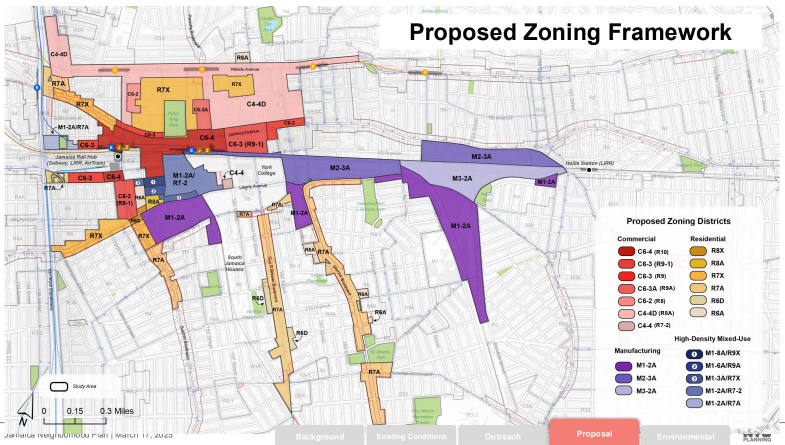Big Changes Coming to Jamaica, Queens Unlocking Over $400M in Local Investment
New York, NY
New York City’s ambitious plan to reshape Downtown Jamaica took a major step forward this
week, as the City Council’s Subcommittee on Zoning and Franchises and Committee on Land
Use both voted unanimously to approve the Jamaica Neighborhood Plan — a large-scale
rezoning poised to bring new housing, jobs, and infrastructure investment to Southeast Queens.
Covering more than 200 blocks across Community Districts 12 and 8, the plan aims to deliver
approximately 11,800 new homes, including 4,000 permanently affordable units, alongside over
2 million square feet of commercial space. It is projected to create 7,000 jobs and represents
the largest neighborhood rezoning in New York City in more than two decades.
The Jamaica Neighborhood Plan establishes the largest Mandatory Inclusionary Housing (MIH)
zone in city history, setting the stage for roughly 3,800 affordable homes to be developed on
privately owned sites. The Department of City Planning (DCP) estimates the initiative will unfold
over a 15-year horizon, significantly reshaping the area’s residential and economic landscape.

A Plan Shaped by Community Priorities
The plan’s passage follows months of negotiation between City Council members and the
Adams administration, resulting in $413 million in community investments. These funds address
local priorities including flooding and sewer infrastructure, parks and open space, transportation,
public health, and education.
Key allocatons include:
● $117 million for park upgrades and two new park designs
● $100 million+ for transportation and public realm improvements, including a new public
plaza at Archer Avenue, removal of the existing bus terminal canopy, new bus shelters,
and $47 million to redevelop Station Plaza
● $70 million for the expansion of Queens Hospital’s Claire Shulman Pavilion
● $78 million to renovate Jamaica Avenue between Sutphin Boulevard and 168th Place
● $22 million to improve stormwater and sewer systems, a key local concern
To ensure transparency and accountability, the City Council will establish a 12-to-15-member Downtown Jamaica Oversight Task Force, operating over four years to monitor progress and implementation.
Leadership and Vision
City Council Speaker Adrienne Adams, who represents much of the Jamaica area, described the rezoning as a model for equitable and inclusive development: “The Jamaica Neighborhood Plan will deliver tens of thousands of new homes, thousands of new jobs, and essential community investments to improve infrastructure, parks, healthcare access, and overall quality of life,” said Speaker Adams. “This level of investment would not have been possible without the Council’s direct role in negotiating community needs.” Councilmember Dr. Nantasha Williams, who helped lead negotiations, called the approval an “important step forward” after years of planning. “Our community was told to wait — for funding, for attention, for change. They deserve results,” Williams said. “This plan finally makes Jamaica a priority, with affordable housing, sustainable jobs, and public spaces that reflect Southeast Queens’ pride and potential.” Mayor Eric Adams echoed those sentiments, calling the rezoning a vital part of his administration’s “pro-housing agenda.” “With this vote, we’re one step closer to creating a thriving, vibrant Jamaica where New Yorkers of all income levels can succeed,” the mayor said. “It’s past time we updated outdated zoning laws that limited opportunity for working families.”

Looking Ahead
While the plan has received broad support from city leadership, Community Boards 8 and 12 issued non-binding votes against it earlier in the process, citing concerns about density and
impacts on homeowners. City officials emphasized that the current plan reflects extensive community input and includes mechanisms for oversight and adaptation as implementation
progresses. The full City Council vote on the Jamaica Neighborhood Plan is expected later this month. If approved, it will join OneLIC, another major Queens rezoning initiative, as part of the city’s
broader effort to align housing production with long-term growth and infrastructure goals. As Southeast Queens continues to evolve, the Jamaica Neighborhood Plan represents both an
economic catalyst and a test case for how community-driven planning and investment can shape New York City’s next generation of mixed-use neighborhoods.
Adapted from Queens Daily Eagle and QNS (October 2025)


